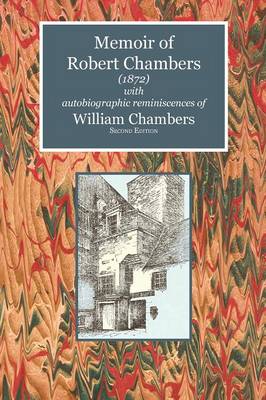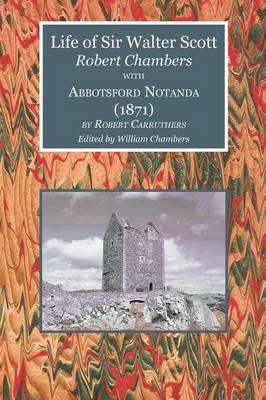Scottelanea: The People and Places of Walter Scott
2 total works
Memoir of Robert Chambers (1872) with Autobiographic Reminiscences of William Chambers
by William Chambers and Robert Chambers
Published 16 August 2013
A quiet Peebles childhood and education is disrupted by war and rapid economic change, resulting in 1813 in the move of the Chambers family to Edinburgh and a new life, initially in 'one of the second-rate streets in the southern suburbs'. In this second, 1872, edition of the history of the personal and business life of the publisher Robert Chambers, his brother William adds his own reflections on the story that followed. It is a lively, fascinating slice of social history - stretching from 'an almost ceaseless drudgery' to a 'luxurious and learned leisure'. At its core is the world of 19th century Scottish book - selling and publishing - book auctions, premises on Leith Walk, publishers' agents, trade-sales, remainders, book - stalls in the open air, printers, book-binders and publishers, book-hawkers, poets, essayists and editors, and patronage and finance. It was also an age of 'progressive steps towards a thoroughly cheap yet original and wholesome literature' for education and entertainment; the establishment of W. & R. Chambers; and the influence and legacy of Sir Walter Scott.
Life of Sir Walter Scott with Abbotsford Notanda (1871)
by Robert Chambers and Robert Carruthers
Published 16 August 2013
These two works were brought together and edited by William Chambers in 1871 and are reprinted here in the Scottelanea Series to complement the view of the life and works of Scott taken by Lockhart in his 1837 biography. The first part is a modest biography of Sir Walter Scott, originally written in Edinburgh by William's brother Robert Chambers, shortly after the novelist's death. It is an overview, an easily read summary for popular consumption, written by a close friend. The second half of the volume, assembled by the journalist and writer Robert Carruthers, is devoted to Scott's relationship and correspondence with his factor and confidential adviser at Abbotsford, William Laidlaw. Its aim was to collect, in part for future biographers, 'domestic details and incidents unrecorded' in the course of a friendship 'too honourable to both parties to be readily forgotten'.

